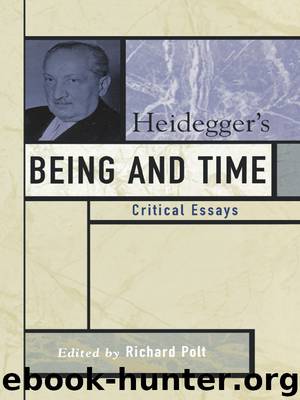Heidegger's Being and Time by Unknown

Author:Unknown
Language: eng
Format: epub
ISBN: 9781461637271
Publisher: Rowman & Littlefield Publishers
Published: 2013-07-11T16:00:00+00:00
A Gap in the Account of Self-Awareness in Being and Time Division I
For all its usefulness, Heidegger’s account of ontologically primordial self-awareness as a reflection back from the things with which I am practically absorbed cannot be considered an adequate account of self-awareness. Nor did Heidegger intend it as such. This is because the ‘I’ who is reflected back in this way is “the ‘who’ of everyday Dasein,” and this, as Heidegger says, “just is not the ‘I myself”’ (BT 150/114). Thus Dasein, as “I myself,” must be capable of another—and ontologically no less authoritative—mode of self-awareness, one not subject to Heidegger’s objections against the merely formal character of reflective I-consciousness. The trick is to say what such a form of self-awareness can be.
An approach can be made by recognizing that the everyday mode of self-awareness in which “Dasein understands itself proximally and for the most part in terms of its world” (BT 156/120) is not a genuine first-person mode of self-awareness. As Heidegger argues, “the self of everyday Dasein is the oneself” (BT 167/129), and it becomes evident from his description of the one-self that it understands (is aware of) itself wholly in third-person terms—a fact that has implications for his account of intentionality.
Central to that account is Heidegger’s claim that things show up ‘as’ something originally within the context of our practical dealings with them. It is because everyday Dasein engages in goal-directed actions that things show up ‘as’ fit for the task, useful ‘in order to’ drive nails, and so on; only so can they be assigned some non-arbitrary ‘significance.’ About this ‘assignments,’ Heidegger emphasizes two things. First, it is holistic: “Taken strictly, there ‘is’ no such thing as a tool. To any tool there always belongs a totality of equipment” (BT 97/68), since to be a hammer or a pen is to be defined in instrumental relation to other things such as nails or paper. Second, the structure (intelligibility) of this equipmental totality derives from Dasein’s own ‘practical identity,’ which Heidegger terms the Worumwillen: an “ability to be for the sake of which” I myself am (BT 119/86). This concept is meant to account for the non-arbitrary attribution of goal-directedness to my activity—that is, it is to serve the role of establishing an intention, without which no specific ‘assignment’ of functions to things could be made. Heidegger’s innovation here is to locate this intention not ‘in the head’ but in practices themselves, as ‘ways for me to be’ in the world. One cannot simply identify this practical identity or ‘for the sake of’ with social role (mother, professor, mail carrier), since not all goal-directed actions belong to socially and institutionally defined practices. Nevertheless, it can serve its function in the account of intentionality only because it, like social role, is necessarily typical. Only because my behavior is understood (not only by the other but by I myself) as a type does it have the relation to specific norms of the type that render it ‘intentional’ behavior—that is, assessable in terms of success or failure.
Download
This site does not store any files on its server. We only index and link to content provided by other sites. Please contact the content providers to delete copyright contents if any and email us, we'll remove relevant links or contents immediately.
Fanny Burney by Claire Harman(26597)
Empire of the Sikhs by Patwant Singh(23075)
Out of India by Michael Foss(16849)
Leonardo da Vinci by Walter Isaacson(13320)
Small Great Things by Jodi Picoult(7123)
The Six Wives Of Henry VIII (WOMEN IN HISTORY) by Fraser Antonia(5505)
The Wind in My Hair by Masih Alinejad(5092)
A Higher Loyalty: Truth, Lies, and Leadership by James Comey(4955)
The Crown by Robert Lacey(4808)
The Lonely City by Olivia Laing(4799)
Millionaire: The Philanderer, Gambler, and Duelist Who Invented Modern Finance by Janet Gleeson(4471)
The Iron Duke by The Iron Duke(4350)
Papillon (English) by Henri Charrière(4263)
Sticky Fingers by Joe Hagan(4189)
Joan of Arc by Mary Gordon(4104)
Alive: The Story of the Andes Survivors by Piers Paul Read(4023)
Stalin by Stephen Kotkin(3959)
Aleister Crowley: The Biography by Tobias Churton(3634)
Ants Among Elephants by Sujatha Gidla(3463)
